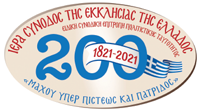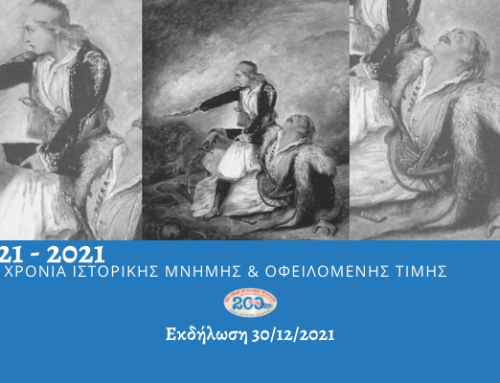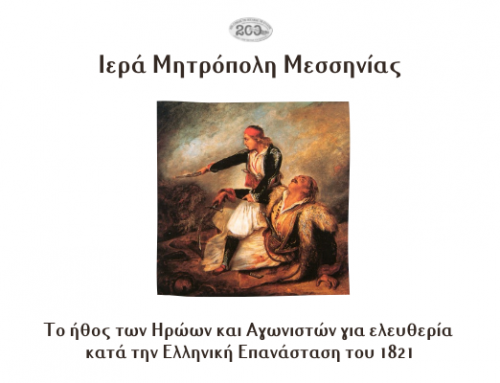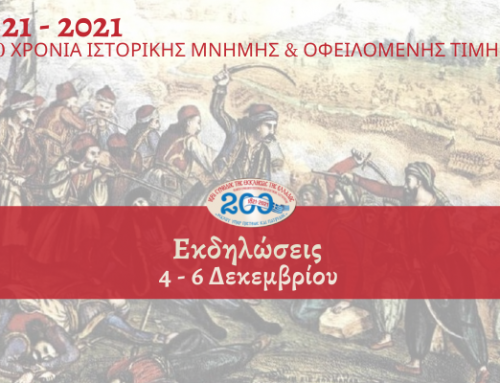Encyclical
“On the occasion of the first day of the Year and of the Commencement of the celebrations for the 200th Anniversary of the Greek Revolution”
Following a proposal submitted by the Special Synodic Committee of Cultural Identity, the Standing Holy Synod issued its Encyclical under no. 3031 to the whole body of the faithful of the Church of Greece called by Christ’s name, entitled “On the occasion of the first day of the Year and of the Commencement of the celebrations for the 200th Anniversary of the Greek Revolution”.
The Encyclical was read out in all the holy churches of the Church of Greece during the Divine Liturgy of January 1, for the Feasts of the Circumcision of the Lord and of Saint Basil and reads as follows:
“Our beloved brethren,
A Happy and Blessed New Year !
Today we celebrate the Circumcision in the flesh of our Lord Jesus Christ and the beginning of the new year 2021. We honour the memory of the wise Saint, Hierarch, Basil the Great, Bishop of Cæsarea of Cappadocia, and, at the same time, we are entering a year which brims with lessons and symbolisms.
Today marks the beginning of the year 2021, during which, despite the healthcare adversities and with respect for the precautionary healthcare measures, the entire Hellenism and every indomitable spirit will honour the 200th Anniversary of the National Revolution of 1821.
The Church celebrates the Revolution as a spiritual event. It celebrates the Struggle for Independence and Regeneration as an instance of the perennial struggle of the human being against tyranny and servitude, whether external or internal, whether collective or individual. In other terms, the Church celebrates 1821 as another Exodus from a mental Egypt, a fact which is also implied through the extraordinary symbolism of the quasi-iconographic depiction of the heroic Sortie of Missolonghi. This is the meaning with which the Church connected the celebration of National “Palingenesia” (i.e. the Rebirth of the Greek Nation) right from the outset, in other terms as a partial fulfilment of the “washing of regeneration” (Titus 3,5) of the entire human being within the historic conjuncture.
The Church knows and chooses to perceive history in non-geopolitical terms, because it understands the world in eschatological terms. This is why the word of the Church, then and now and always, constitutes “foolishness” and a “stumblingblock” (Cor. 1,18, 23). The Church thinks in terms of “liturgical time” and this is so because, as bearer of the Revelation of the Divine Word, vis-à-vis the people who constitute it and whom it shepherds, it assumes the responsibility to transform space and time.
The daring of our ancestors was great! Four hundred years under the oppression of the Ottoman yoke and yet they held on to their faith, national identity, and hope. If other nations had suffered the tyranny of the Ottoman yoke even for only a few decades they would have been alienated. However, despite the forced recruitment of Christian boys, the slave trade, the innumerable acts of violence, Hellenism survived, relying upon the Orthodox Church, the sacrifice of the Neomartyrs and its fighting spirit.
Today we invite you to bend the knee before the venerable memory of the Neomartyrs and the Heroes of our faith and fatherland; of those men and women, whether clergy or laity, who did not cower in front of the headsman’s sword or the kadi’s gallows and proclaimed their faith in the Resurrected Christ. The Neomartyrs sacrificed their lives in order to articulate to the Orthodox Greeks the message that they should not convert to Islam, that they should not end up renegades, that there is no future without the light of Christ.
Most of the Neomartyrs would have saved their lives if they had converted. Nonetheless, they stood upright, with a Christian ethos and Greek courage. They preferred a martyr’s death to a change of faith and national consciousness. Let us not forget that anyone lost to Orthodoxy would have also been lost to Hellenism. Anyone converted to Islam would “have become a Turk” and a persecutor of his former brothers and sisters.
“This truly is like a miracle, to see freedom at a time of captivity, as if one saw spring flowers and roses in the heart of the winter”! This is how Saint Nikodemos of Mount Athos expressed his admiration of Neomartyrs, those who, after the Fall of Constantinople, contended well and whose lives were terminated through sword or gallows. That prolific monk of the 18th century from Naxos wrote 87 Lives of Neomartyrs in the famous “New Martyrology” published in 1799. In it, he also included Saint Cosmas the Aetolian (1714-1779), Illuminator of the slaves, who labored untiringly to prevent acts of Islamization and to spread Greek Orthodox learning.
The Neomartyrs were the first resistance fighters against servitude, as the late theologian and historian Father Gheorghios Metallinos called them. Those hallowed figures, this real cloud of the thousands of Neomartyrs, were the pioneers of the Greek Revolution. If they had not sacrificed themselves for faith and fatherland, there would have been no Orthodox Greeks to fight in 1821.
The Greek Revolution was a national and religious one. In this sense, it did not copy any other revolution nor, in addition, could it have been inspired by ideologies containing atheist or anticlerical messages.
In his work entitled “The Great Church in Captivity”, Steven Runciman, leading British Byzantinist of the 20th century, wrote that “It was Orthodoxy that preserved Hellenism through the dark centuries; but without the moral force of Hellenism Orthodoxy itself might have withered”.
It was the sign of the Cross “through which we are always victorious” that Alexandros Ypsilantis put forward in his first Declaration of February 24, 1821. As early as October 1820 the Society of Friends had set the feast of the Annunciation, March 25, as Day One of the uprising, in order to demonstrate the connection of the Virgin Mary with Freedom, Faith and Fatherland.
Christ was in effect connected with the Greeks as members of the Body of His Church. The protagonists of the Struggle would proclaim their Christian faith and in all the National Assemblies would place the invocation to the Holy Trinity in the preambles of the respective Constitutions.
Knowing that the Orthodox clergy was the spiritual leadership of Hellenism, the Ottomans unleashed their revenge first of all against them, by putting Patriarchs, bishops, priests, monks, and nuns to a martyr’s death.
The figure of Patriarch Gregorios V of Constantinople, Holy National Martyr, stands out among them. His relic is kept in the Cathedral of Athens along with the holy relics of the Mistress of Athens, Saint Philothei.
Freedom required virtue and boldness indeed! Conditions were unfavorable. The so-called Holy Alliance was opposed to national acts of uprising on the part of peoples on the grounds that such acts would cause large empires to disintegrate. Though outnumbered, the Greeks managed to free themselves.
Despite the discord, which put the Struggle in danger, they managed to rise against the Ottoman tyrant, to put freedom before death, and thus to achieve the former.
The Greeks existed, exist, and will exist! As Archbishop Kyprianos of Cyprus, Martyr of the Nation in 1821, tellingly replied to his Ottoman governor and executioner: “Greekness will perish only when the world will perish”! In other terms, Orthodox Hellenism will exist, will survive, and will keep fighting until the end of time.
We saw brethren being lost, but we did not become fainthearted! We saw conquests and losses of territories but never ceased to fight! Faith in God, the consciousness of the continuity of our Nation, our love of letters, our ethos of resistance, community solidarity, those were part of the spiritual gear which led to Freedom and made the movement of Philhellenism grow.
Even though it took 400 years in Southern Greece and 500 years in Northern Greece for all the lands where Greeks lives to be liberated, we kept the flame unquenchable and were not disheartened! We were not subjugated morally or spiritually.
We were and always have been free, in our hearts, our thought, our state of mind, our conscience!
Through the Special Synodic Committee of Cultural Identity, the Holy Synod of the Church of Greece has planned 261 events throughout the Greek territory so that the great anniversary may be honoured by means of the organization of publications, conferences, worship synaxes and artistic events.
The Programme is already uploaded on the site www.ekklisia1821.gr, which the Holy Synod has created especially for the Synodic and peripheral actions of the Church of Greece during the year 2021.
At the same time, synergies with Universities, local government and other authorities are being prepared.
Our brethren do come and join us!
It is time we learned, remembered, thought anew;
About Freedom and Self-determination, about Law and Unity, about Worth and Prudence;
For the sake of the Holy Faith in Christ and of the Freedom of the Fatherland;
By virtue of all those ideals who made us light-bearers of fighting spirit, culture and industriousness, we have the duty and the incomparable honour during this highly significant year to celebrate the 200th anniversary of a Nation Resurrected.
And if we think that adversities can defeat us, let us always remember that we reconstituted our state drawing upon the ideals of 1821, while “all was shadowed by menace and overwhelmed by slavery”.
It is time we honoured our blood; it is time we looked our history in the eye; this history, which brightened our Nation to the ends of the Ecumene; this glory, which crowns our seas and lands; this faith, which keeps hope unwavering across this country, from Crete to Thrace and from Epirus to our martyr Cyprus.
With knowledge of the past and with a Christian certainty about the future, the Great Hours of the Nation guide us!
We wholeheartedly wish to all that the new year may grant every good thing from Lord Jesus Christ who became an infant for our salvation; that the new year may be peaceful and blessed.
With emotion, pride, and fatherly love,
† IERONYMOS of Athens, President
† Iakovos of Mytilini, Eressos and Plomarion
† Demetrios of Goumenissa, Axioupolis and Polykastron
† Panteleimon of Veroia, Naoussa and Campania
† Damaskenos of Didymoteichon, Orestias and Souflion
† Andreas of Dryinoupolis, Pogoniani and Conitsa
† Panteleimon of Xanthi and Peritheorion
† Kallinikos of Arta
† Athenagoras of Ilion, Aharnai and Petroupolis
† Dionyssios of Zakynthos
† Kyrillos of Kifissia, Amaroussion and Oropos
† Gabriel of Nea Ionia, Philadelphia, Erakleion and Halkedon
† Antonios of Glyfada, Ellinikon, Voula, Vouliagmeni and Vari
The Chief Secretary
† Philotheos of Oraioi”





